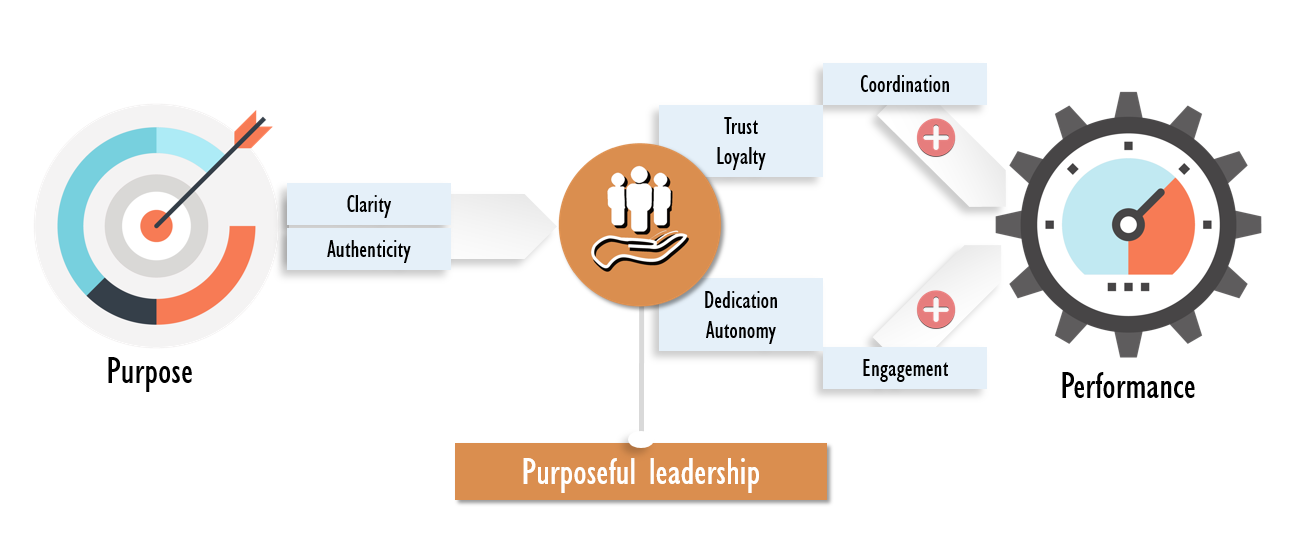THINK
Purposeful Leadership
With Purposeful Leadership, we do research to unleash human potential by placing purpose at the heart of leadership. Our world-class research team is working to understand the conditions that make purpose a driver of both personal fulfilment and organizational performance.
What the research demonstrates
Most of us have the intuition that a concrete goal that goes beyond profit maximization is essential for companies’ effectiveness and performance. But evidence indicates that simply having a purpose does not necessarily improve organizational effectiveness nor performance. Why should it be? Purposes come in multiple forms and shapes and at least half of them could be energizing and the other half cheap talk, resulting in a null effect on average.
What researchers have found to be crucial for purpose to result in higher performance is how clearly employees perceive their organizations’ purpose and how authentic this purpose is in relation to practice.
We also know that performance benefits from enhanced engagement toward activities not directly related to financial performance (pro-bono, corporate social initiatives in general) and better coordination among organizational members.
How then can purposeful leadership have an impact on performance?
This impact is actually channeled through an increase in labor productivity and current research suggests that this increase relies on two connected mechanisms: one, an increase in deeper trust and loyalty; two, an increase in dedication and autonomy.
Thus, we assume that the fusion of the purpose and the strategy of a company, driven by a purposeful leadership that creates trust and engagement, together allows companies to improve performance through better coordination and higher engagement.

Managers are expected to help their teams develop a clear sense of their organizations’ purpose and how their everyday work is related to this purpose. The way and the degree to which managers achieve this varies considerably, but the more actively managers engage in behaviors intended to communicate the organizations’ purpose, the more clearly their teams will perceive it.
For all these reasons, we are thrilled to conduct research on purposeful leadership.
Latest Research Papers Published in Scientific Journals
- Rodolphe Durand, From the Boardroom: Making Purpose Research Relevant for Practice, Strategy Science, 2023
- Durand R. & Gouvard G. (2022) An audience-based theory of firm purposefulness, Lockwood, C. and Soublière, J.-F. (Ed.) Advances in Cultural Entrepreneurship (Research in the Sociology of Organizations, Vol. 80), Emerald Publishing Limited, Bingley, 193-216
- Durand R. and Huynh C-W (2021) Legitimacy Judgments and Prosociality: Organizational Purpose Explained, in Handbook on the Business of Sustainability: The Organization, Implementation, and Practice of Sustainable Growth, Gerry George, Martine R. Haas, Havovi Joshi, Anita McGahan and Paul Tracey (eds), Edward Elgar Publishing, Chetelham, UK, 42-60
Examples of Research
The S&O Purpose Day 2023 has permitted to it's four PhD's affiliated students, Nauman Asghar, Pauline Asmar, Pauline Asmar, Chang-Wa Huynh, to present their research, around topics such as:
- How autonomy and trust combine to stimulate innovation team culture (but only when leaders relate team work to organizational purpose);
- Leaders’ purpose-based communication and how it enhances their team’s commitment.
- How the moral dimension of purpose can tamper down the attractiveness of a company;
- How the combination of purpose and greater autonomy for manager enhances firm performance;
- And how relevant purpose communication can neutralize age and gender dissimilarities between a team and its leader.
Collection of Purpose Booklet
APPROACHES TO PURPOSEFUL LEADERSHIP
ARE WE ALL EQUALLY SENSITIVE TO PURPOSE IN THE WORKPLACE?
THE DUAL EFFECT OF PURPOSE ON TEAMS
CORPORATE PURPOSE, MANAGERIAL AUTONOMY, AND PERFORMANCE
Research Team














